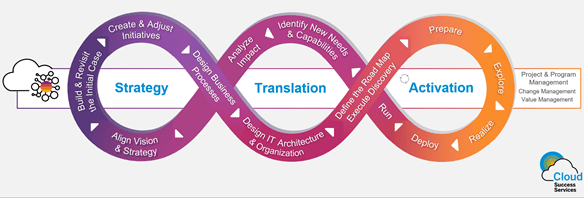Executives often speak highly of the vast potential of cloud technologies. But in practice, fewer than expected business capabilities are supported by cloud services and applications. Why do so many still struggle to connect the dots between cloud technology and their digital transformation aspirations?
The answer is quite simple: true business transformation in the cloud requires a comprehensive approach that unites the strategy, organization, process, and technology needed to optimize performance and accelerate innovation.
Redefining the Pathway to True Transformation
Over the past few years, cloud technology has evolved into an alternative business transformation option based on continuous learning and business improvement. Once a traditional exercise of highly integrated and standardized solutions and long, predefined timelines, cloud implementations have become more agile with small, digestible steps for delivering new innovations and adopting next practices.
Take, for example, public cloud solutions. The technologies offer the opportunity to standardize, harmonize, and simplify processes, especially in non-differentiating areas. However, those gains do not come without sacrifices. Compared to highly customized on-premise solutions, companies need to be willing to bring their processes to the cloud’s standards while questioning previous on-premise investments that are customized and automated.
Every business starts at a different point and can select between standardization and differentiation strategies. Organizations can continuously innovate new business models, products, and services and optimize various areas of their operations to achieve or maintain a competitive edge, even during times of rapid expansion or massive disruption. Cloud technology offers the means to focus on core competencies and outsource as much or as little as needed.
Adding Value and Impact with Expertise and Guidance
Cloud technology comes in many forms, including infrastructure as a service (IaaS), platform as a service (PaaS), and software as a service (SaaS). In all of these cloud variations, the technology enables rapid, secure scaling through a subscription or pay-as-you-go model.
However, it is essential to note that each cloud choice serves a specific purpose and should be evaluated and selected on a case-by-case basis, even when migrating to a modern, cloud-based enterprise resource planning (ERP) system. IaaS helps transfer the operation of IT hardware and related services to an infrastructure provider. PaaS offers a platform that can be used to build own software while being operated in a cloud environment. SaaS offers standard software for defined functionality in a cloud model.
Companies can determine which cloud option is best for the next stage of their digital transformation with SAP Advisory Services from the Cloud Success Services organization at SAP. Based on a holistic digital transformation framework, Cloud Success Services helps SAP customers connect every single step of the cloud adoption process ‒ from strategy to translation to activation ‒ in a continuous loop of innovation and optimization. The framework directs cloud-based business transformation with a portfolio of advisory methods, tools, and expertise that accelerates time to value.

SAP Intelligent Enterprise Framework is a proven methodology that brings together IT and business areas along a continuous journey of technology evolution. SAP customers can considerably impact their digital transformation initiative by working with Cloud Success Services. As soon as the value of the SAP solution is identified and aligned with strategic goals, they can improve processes, enhance organizational capabilities, and realize next practices and innovations early.
By taking part in the initial development of the digital strategy, Cloud Success Services can help adjust predefined plans and timelines to address emerging business needs or adopt technology capabilities faster as the opportunity arises. In essence, the organization meets SAP customers wherever they are on their digital journey, whether they are taking the first step, approaching the midway point, or trailblazing the future of digital transformation.
Setting the Foundation for Agility and Trust
A cloud-based business model changes much more than the value of companies’ software assets and revenue streams. Ultimately, it fosters a relationship with the software provider that drives transformation agility and trust.
And that’s the same experience that SAP customers can expect from Cloud Success Services. By designing a cloud environment that considers their people, processes, and existing technology systems, they can make each phase of their digital transformation journey even more successful than the last.



